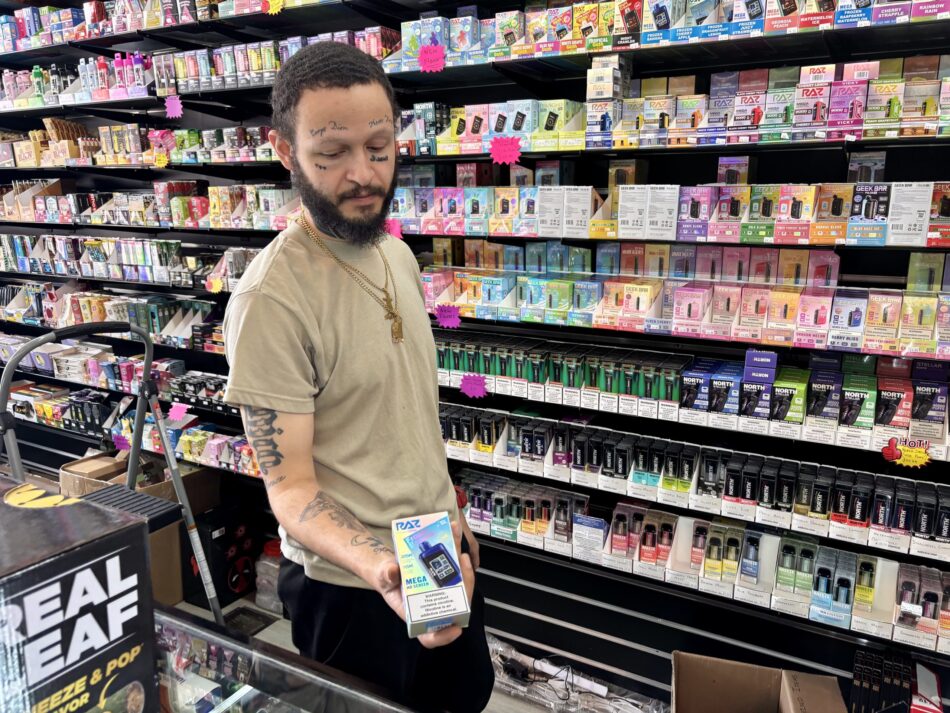A 180-day moratorium on new vape and smoke shops in Akron went into effect in early May while the city considers how it can or should limit their growth.
Sponsored by At-large Council Member Jeff Fusco and Mayor Shammas Malik, it suspends any authorization of conditional uses for new businesses and is the city’s latest attempt to create restrictions around its vape and smoke shops. City Council voted in June 2024 to require a minimum distance of 2,500 feet between vape shops in the city.
When the moratorium was imposed, there were three vape shops with conditional-use requests pending approval. They were “grandfathered in,” Fusco said at the May 5 City Council meeting.
One of the businesses hoping to be approved as a vape shop (it’s now considered a smoke shop) before any new regulations are set is Smoke Shop+ at 822 W. Market St. in Highland Square.
Smoke Shop+ opened Jan. 10 after council members granted the business a signage permit.
Less than two weeks later, on Jan. 22, the building’s landlord, who owns some of the adjacent properties, including Highland Square Theatre two doors to the west, received a notice from the Akron Zoning Department that the store was operating as a vape store without the proper conditional-use approval and needed to stop operation immediately.
Akron vape and smoke shop locations
The difference between smoke shops and vape shops
The Akron ordinances describe a vape shop as “any business whose principal product line for retail sale is alternative nicotine products or vape juice, or both.” These are considered principal products if they account for at least 25% of the business’s annual retail sales.
A smoke shop, as defined by the moratorium, is an establishment of which at least 20% of its retail sales come from selected products and/or at least 20% of the retail space is used for the selected products.
The selected products include (definitions below):
- Products containing any form of nicotine intended for human consumption (smoked and smokeless tobacco products, electronic cigarettes or vapes, nicotine pouches, etc.).
- Products containing, made of or derived from CBD or kratom.
- Any hemp-derived or synthetic cannabinoid, including Delta-8 THC.
- Devices intended to aid, accompany, enable or facilitate the use of these products (things like water pipes, rolling papers, etc.).

Highland Square smoke shop wants to expand vape sales
Vape-related products represented about 15% of total sales at Smoke Shop+, according to a statement that shop owner Muhammed Traish submitted to council, so the store did not meet the threshold where a vape store conditional-use permit would be required.
After receiving the notice, Traish decided to apply for a vape shop conditional-use permit, to “work with the city,” said attorney Jack Morrison, who spoke on Traish’s behalf at the June 9 public hearing for the shop’s conditional-use permit. Traish was traveling out of the country on a trip planned before he received the hearing notice, he said in his statement.
On May 16, the Akron Planning Commission recommended disapproval of the conditional-use request, as it would “encourage unhealthy activities with long term consequences for individuals and the community.”
The recommendation also mentioned the business’ location within 500 feet of Portage Path Community Learning Center — as the smoke shop intends to sell hemp- and marijuana-derived products. Because the shop is not a dispensary, the 500-foot minimum distance restriction does not apply, but the planning commission wanted it taken into consideration.
After the June 9 public hearing, council members decided to take more time to decide the fate of the smoke shop.

Lack of regulations a concern for residents, council member says
The moratorium affects vape shops and smoke shops but does not affect marijuana dispensaries, which are governed by a different set of laws and regulations.
The state heavily regulates marijuana dispensaries, Fusco said, from things like keeping the merchandise secure to the contents of the products. These regulations do not apply to vape shops, he added, “so we don’t know what people are purchasing and inhaling.” The lack of regulations has also been a growing concern for residents.
“Some of the complaints, you know, the hours [the vape/smoke shops operate], the smells emitting from there, we don’t get these complaints from the marijuana dispensaries,” Fusco said.
In recent years, cities across Ohio have started placing their own regulations on nicotine products and the stores that sell them. Last year, an Ohio judge ruled that the state cannot stop cities from banning flavored vapes — Cincinnati and Columbus have bans in effect.
And in April, Cleveland passed an ordinance that limits the advertising on smoke shop storefronts, sets age limits on the sale of tobacco and vaping products, prohibits the sale of marijuana in smoke shops and subjects smoke shops to two inspections per year.
Lawyers need to be in the room when deciding how Akron should proceed, Fusco said, so that the city remains within bounds with what they are allowed to do.
“We don’t want to step into anyone’s rights, constitutional rights, to sell and make money…” Fusco said. “We do want to protect our citizens, at the end of the day.”
What do these terms mean?
CBD: Cannabidiol is a compound, or cannabinoid, found in cannabis plants. It is marketed in products such as lotions, oils, capsules, food and drink. CBD does not cause a “high” but can cause sleepiness or drowsiness, increased appetite or mood changes.
THC: Tetrahydrocannabinol, or THC, is the substance in cannabis that causes a “high.”
Hemp: A marijuana plant that contains .3% or less THC (by dry weight).
Delta-8 THC: Trace quantities of the cannabinoid Delta-8 THC can be found in cannabis, but they can also be synthesized from hemp. It causes only a fraction of the “high” THC does, according to Harvard Health Publisher.
Kratom: A tropical tree native to Southeast Asia. The plant’s two main chemical components, mitragynine and 7-hydroxymitragynine, are psychoactive. Products derived from Kratom leaves are “often used to self-treat conditions such as pain, coughing, diarrhea, anxiety and depression, opioid use disorder, and opioid withdrawal,” according to the Food and Drug Administration.






